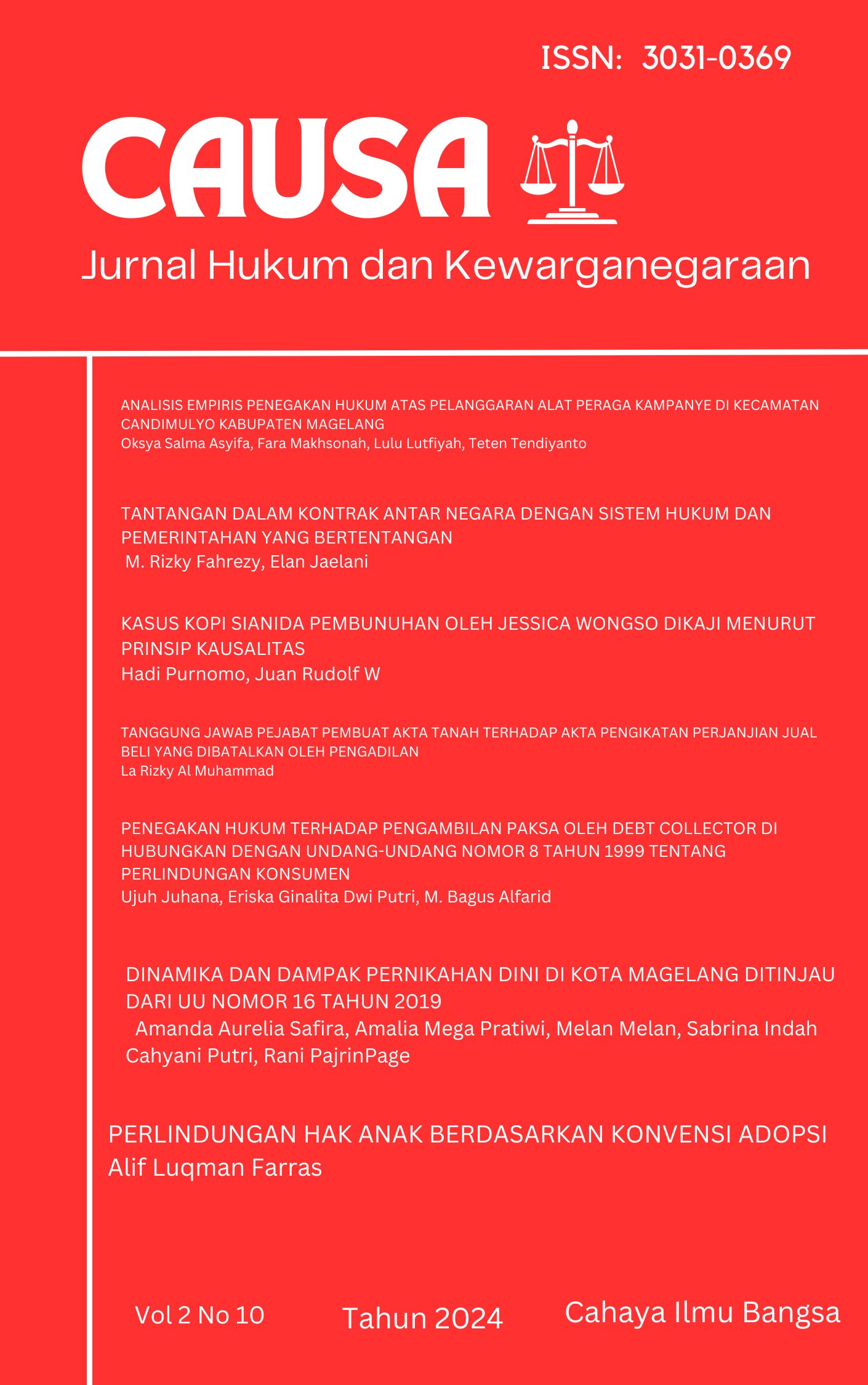REVITALISASI HUKUM ADAT MELALUI PENDEKATAN RESTORATIVE JUSTICE TERHADAP KRIMINALISASI MODERN DI INDONESIA
- Authors
-
-
Dayinta Hutabarat
IndividuAuthor -
Christian Samuel Pangaribuan
IndividuAuthor
-
- Keywords:
- Hukum Adat, Restorative Justice, Kriminalisasi, Customary Law, Criminalization
- Abstract
-
Dalam sistem hukum nasional Indonesia, ketidaksinkronan antara hukum formal dan hukum adat telah menimbulkan berbagai konflik, terutama dalam bentuk kriminalisasi terhadap praktik-praktik adat yang tidak dipandang sebagai pelanggaran dalam perspektif lokal. Pendekatan restorative justice menawarkan alternatif penyelesaian konflik yang sejalan dengan prinsip-prinsip hukum adat, seperti musyawarah, rekonsiliasi, dan pemulihan hubungan sosial. Penelitian ini bertujuan untuk mengeksplorasi potensi revitalisasi hukum adat melalui integrasi pendekatan restorative justice sebagai respons terhadap over kriminalisasi yang dialami masyarakat adat. Metode yang digunakan adalah pendekatan kualitatif normatif dengan analisis terhadap dokumen hukum, regulasi, serta studi kasus. Hasil penelitian menunjukkan bahwa mekanisme penyelesaian adat yang berakar pada nilai-nilai lokal dapat menjadi bagian dari sistem peradilan nasional yang lebih plural dan kontekstual, asalkan didukung oleh pengakuan hukum formal dan kebijakan yang memberdayakan lembaga adat. Revitalisasi hukum adat melalui pendekatan restoratif menjadi solusi strategis dalam membangun keadilan yang inklusif, berakar budaya, dan konstitusional.
Kata Kunci: Hukum Adat, Restorative Justice, Kriminalisasi
AbstractIn Indonesia's national legal system, the disconnect between formal law and customary law has led to various conflicts, particularly the criminalization of traditional practices that are not considered violations from a local cultural perspective. The restorative justice approach offers an alternative conflict resolution mechanism aligned with customary principles such as deliberation, reconciliation, and social restoration. This research explores the potential revitalization of customary law through the integration of restorative justice in response to the overcriminalization faced by indigenous communities. Using a normative qualitative method, the study analyzes legal documents, regulations, and case studies. The findings suggest that customary dispute resolution mechanisms rooted in local wisdom can be integrated into a more plural and contextual national legal system, provided that formal recognition and empowering policies for customary institutions are established. Revitalizing customary law through restorative justice represents a strategic solution to building inclusive, culturally grounded, and constitutionally aligned justice.
Keyword: Customary Law, Restorative Justice, Criminalization
- Downloads
- Published
- 2025-06-02
- Section
- Articles
How to Cite
Similar Articles
- Firmeinia Qoltiana, Rahmatul Hidayati, REHABILITASI TERHADAP ANAK PENYALAHGUNA NARKOTIKA , Causa: Jurnal Hukum dan Kewarganegaraan: Vol. 15 No. 2 (2025): Causa: Jurnal Hukum dan Kewarganegaraan
- Muhamad Soli , Habibi Al Amin , POTENSI KONFLIK DALAM TRADISI PERKAWINAN ETNIS MADURA PERSPEKTIF MASLAHAH MURSALAH (Studi Kasus Uang Asap Pada Keluarga Madura Desa Sutera Kecamatan Sukadana Kabupaten Kayong Utara) , Causa: Jurnal Hukum dan Kewarganegaraan: Vol. 14 No. 5 (2025): Causa: Jurnal Hukum dan Kewarganegaraan
- Ali Imran, PERAN POLITIK HUKUM DALAM PEMBENTUKAN SISTEM ARBITRASE SEBAGAI ALTERNATIF PENYELESAIAN SENGKETA (Tinjauan atas Undang-Undang No. 30 Tahun 1999 Tentang Arbitrase dan Alternatif Penyelesaian Sengketa) , Causa: Jurnal Hukum dan Kewarganegaraan: Vol. 14 No. 7 (2025): Causa: Jurnal Hukum dan Kewarganegaraan
- Khalisa Noer Afina, Sesilya Karisma Dewi Ayu Hermawan, URGENSI PENEGAKAN HUKUM YANG BERKEADILAN DALAM KONTEKS REFORMASI INDONESIA , Causa: Jurnal Hukum dan Kewarganegaraan: Vol. 14 No. 10 (2025): Causa: Jurnal Hukum dan Kewarganegaraan
- Betti Rahmasari, M. Fachri Hanafi, Alief Akbar, Tuti Widya Ningsih, ANALISIS YURIDIS KOMPARATIF TERHADAP PUTUSAN HAKIM PADA PERKARA No.678/Pid.B/2024/Pn.Pbr DAN No.490/Pid.B/2024/Pn.Pbr SERTA RELEVANSINYA DENGAN TEORI KEADILAN , Causa: Jurnal Hukum dan Kewarganegaraan: Vol. 14 No. 1 (2025): Causa: Jurnal Hukum dan Kewarganegaraan
- Risma Elvariani, Cekli Setya Pratiwi, KEADILAN DALAM PERSPEKTIF HUKUM ALAM:MENGURAI PELANGGARAN HAM BERAT PADA PERISTIWA PANIAI , Causa: Jurnal Hukum dan Kewarganegaraan: Vol. 14 No. 1 (2025): Causa: Jurnal Hukum dan Kewarganegaraan
- Naufal Qushoyyi, Wevy Efticha Sari, Dwi Putri Lestari, PENGARUH KONVENSI INTERNASIONAL TERHADAP PENEGAKAN HUKUM PIDANA TRANSNASIONAL , Causa: Jurnal Hukum dan Kewarganegaraan: Vol. 12 No. 5 (2025): Causa: Jurnal Hukum dan Kewarganegaraan
- Aria Saputra, Aurel Meidina Zammara, Farrel Rajendra Suprobo, Ronaldindo Rifky Trihandoko, PERLINDUNGAN HUKUM TERHADAP HAK-HAK PASIEN DALAM KASUS MALPRAKTIK MEDIS DAN IMPLIKASINYA DALAM SISTEM KESEHATAN , Causa: Jurnal Hukum dan Kewarganegaraan: Vol. 14 No. 4 (2025): Causa: Jurnal Hukum dan Kewarganegaraan
- Galuh Abdul Syahadat, OPTIMALISASI MEDIASI SEBAGAI ALTERNATIF PENYELESAIAN SENGKETA HAK KEKAYAAN INTELEKTUAL DALAM PERSPEKTIF KEPERDATAAN , Causa: Jurnal Hukum dan Kewarganegaraan: Vol. 12 No. 12 (2025): Causa: Jurnal Hukum dan Kewarganegaraan
- Reinaldi Hutabarat, Henny Nuraeny, MEKANISME GANTI KERUGIAN DALAM PENYELESAIAN PERKARA TINDAK PIDANAPENIPUAN SECARA RESTORATIVE JUSTICE , Causa: Jurnal Hukum dan Kewarganegaraan: Vol. 15 No. 7 (2025): Causa: Jurnal Hukum dan Kewarganegaraan
You may also start an advanced similarity search for this article.

